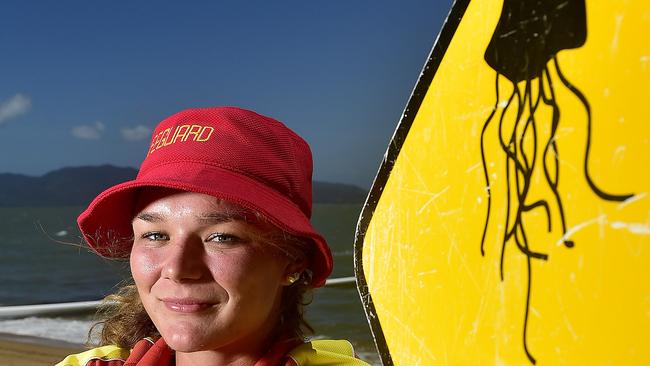Lifeguards catch highly venomous stingers off Townsville beaches
Potentially deadly stingers have been caught off Townsville beaches as northerly winds continue to keep water temperatures high.

Townsville
Don't miss out on the headlines from Townsville. Followed categories will be added to My News.
POTENTIALLY deadly stingers have been caught off Townsville beaches as northerly winds continue to keep water temperatures high.
Surf Life Saving Queensland Townsville lifeguard supervisor Russell Blanchard said lifeguards had been catching box jellyfish during sweeps at Pallarenda, The Strand and Horseshoe Bay on Magnetic Island.
While stinger nets are designed to prevent swimmers from coming into contact with jellyfish’s stinging tentacles, Mr Blanchard said juvenile box jellyfish and the small Irukandji could still slip through.
“Once we get them around that fist sized they can be dangerous to an infant, pregnant woman, or people with existing health issues,” Mr Blanchard said.
Mr Blanchard said there had been no major stings off Townsville’s patrolled beaches so far this summer.
RELATED
Nets go out in Townsville to protect swimmers from dangerous box jellyfish
Townsville beaches closed over king tide contamination fears
Townsville University Hospital Emergency Department director Dr Luke Lawton warned box jellyfish, regarded as the most venomous creature on earth, carried a “very nasty” venom.
“It’s a very powerful paralysing agent, so it can stop you breathing directly, and it also encourages cell death. It can actually cause the death of muscle tissue and heart muscle tissue,” Dr Lawton said.
“It’s important people getting in the ocean wear stinger nets and swim in areas that are covered by stinger nets, that is a sensible way of avoiding what is a completely avoided problem.”
Mr Blanchard said it was important people flooded stings with vinegar.
He said Irukandji stings started as a mild discomfort before becoming a painful ”syndrome” up to 45 minutes later.
Dr Lawton explained the venom make-up in Irukandji was different to the box jellyfish.
He said it affected the nervous system which monitors people’s blood pressure and heart rate.
“They can cause your blood pressure and heart rate to climb quite substantially. As a result of that it is possible to incur a greater risk of having a heart attack or stroke,” Dr Lawton said.
Dr Lawton said vinegar inactivated any stinger cells in tentacles which had not fired, but did not reverse the venom.
People who have been stung by a stinger should phone triple-0.
Originally published as Lifeguards catch highly venomous stingers off Townsville beaches


